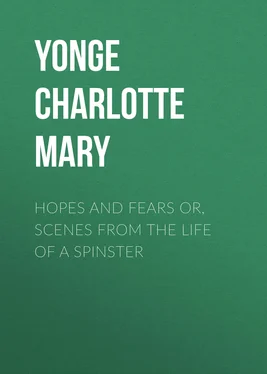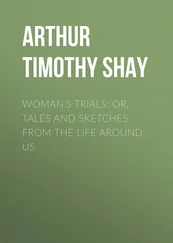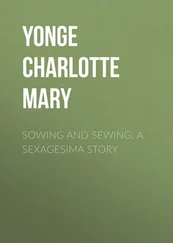Charlotte Yonge - Hopes and Fears or, scenes from the life of a spinster
Здесь есть возможность читать онлайн «Charlotte Yonge - Hopes and Fears or, scenes from the life of a spinster» — ознакомительный отрывок электронной книги совершенно бесплатно, а после прочтения отрывка купить полную версию. В некоторых случаях можно слушать аудио, скачать через торрент в формате fb2 и присутствует краткое содержание. Жанр: foreign_prose, literature_19, Европейская старинная литература, foreign_antique, на английском языке. Описание произведения, (предисловие) а так же отзывы посетителей доступны на портале библиотеки ЛибКат.
- Название:Hopes and Fears or, scenes from the life of a spinster
- Автор:
- Жанр:
- Год:неизвестен
- ISBN:нет данных
- Рейтинг книги:5 / 5. Голосов: 1
-
Избранное:Добавить в избранное
- Отзывы:
-
Ваша оценка:
- 100
- 1
- 2
- 3
- 4
- 5
Hopes and Fears or, scenes from the life of a spinster: краткое содержание, описание и аннотация
Предлагаем к чтению аннотацию, описание, краткое содержание или предисловие (зависит от того, что написал сам автор книги «Hopes and Fears or, scenes from the life of a spinster»). Если вы не нашли необходимую информацию о книге — напишите в комментариях, мы постараемся отыскать её.
Hopes and Fears or, scenes from the life of a spinster — читать онлайн ознакомительный отрывок
Ниже представлен текст книги, разбитый по страницам. Система сохранения места последней прочитанной страницы, позволяет с удобством читать онлайн бесплатно книгу «Hopes and Fears or, scenes from the life of a spinster», без необходимости каждый раз заново искать на чём Вы остановились. Поставьте закладку, и сможете в любой момент перейти на страницу, на которой закончили чтение.
Интервал:
Закладка:
Mr. Parsons had not taken the cue unknowing of what he should find in it; he said nothing, and looked as simple and cheerful as if his life were not to be a daily course of heroism. His wife gave one long, stifled sigh, and looked furtively upon him with her loving eyes, in something of anxious fear, but with far more of exultation.
Yet it was in no dispirited tone that she asked after the respectable poor—there surely must be some employed in small trades, or about the warehouses. She was answered that these were not many in proportion, and that not only had pew-rents kept them out of church, but that they had little disposition to go there. They did send their children to the old endowed charity schools, but as these children grew up, wave after wave lapsed into a smooth, respectable heathen life of Sunday pleasuring. The more religious became dissenters, because the earnest inner life did not approve itself to them in Church teaching as presented to them; the worse sort, by far the most numerous, fell lower and lower, and hovered scarcely above the depths of sin and misery. Drinking was the universal vice, and dragged many a seemingly steady character into every stage of degradation. Men and women alike fell under the temptation, and soon hastened down the descent of corruption and crime.
‘Ah!’ said Mrs. Parsons, ‘I observed gin palaces at the corner of every street.’
There was a pause. Neither her husband nor Honor made any reply. If they had done so, neither of the young Fulmorts would have perceived any connection between the gin palaces and their father’s profession; but the silence caused both to raise their eyes. Phœbe, judging by her sisters’ code of the becoming, fancied that their friends supposed their feelings might be hurt by alluding to the distillery, as a trade, and cast about for some cheerful observations, which she could not find.
Robert had received a new idea, one that must be put aside till he had time to look at it.
There was a ring at the door. Honor’s face lighted up at the tread on the marble pavement of the hall, and without other announcement, a young man entered the room, and as she sprang up to meet him, bent down his lofty head, and kissed her with half-filial, half-coaxing tenderness.
‘Yes, here I am. They told me I should find you here. Ah! Phœbe, I’m glad to see you. Fulmort, how are you?’ and a well-bred shake of the hand to Mr. and Mrs. Parsons, with the ease and air of the young master, returning to his mother’s house.
‘When did you come?’
‘Only to-day. I got away sooner than I expected. I went to Lowndes Square, and they told me I should find you here, so I came away as soon as dinner was over. They were dressing for some grand affair, and wanted me to come with them, but of course I must come to see if you had really achieved bringing bright Phœbe from her orbit.’
His simile conveyed the astronomical compliment at once to Honora and Phœbe, who were content to share it. Honora was in a condition of subdued excitement and anxiety, compared to which all other sensations were tame, chequered as was her felicity, a state well known to mothers and sisters. Intensely gratified at her darling’s arrival, gladdened by his presence, rejoicing in his endowments, she yet dreaded every phrase lest some dim misgiving should be deepened, and watched for the impression he made on her friends, as though her own depended upon it.
Admiration could not but come foremost. It was pleasant to look upon such a fine specimen of manly beauty and vigour. Of unusual height, his form was so well moulded, that his superior stature was only perceived by comparison with others, and the proportions were those of great strength. The small, well-set head, proudly carried, the short, straight features, and the form of the free massive curls, might have been a model for the bust of a Greek athlete; the colouring was the fresh, healthy bronzed ruddiness of English youth, and the expression had a certain boldness of good-humoured freedom, agreeing with the quiet power of the whole figure. Those bright gray eyes could never have been daunted, those curling, merry lips never at a loss, that smooth brow never been unwelcome, those easy movements never cramped, nor the manners restrained by bashfulness.
The contrast was not favourable to Robert. The fair proportions of the one brought out the irregular build of the other; the classical face made the plain one more homely, the erect bearing made the eye turn to the slouching carriage, and the readiness of address provoked comparison with the awkward diffidence of one disregarded at home. Bashfulness and depression had regained their hold of the elder lad almost as the younger one entered, and in the changes of position consequent upon the new arrival, he fell into the background, and stood leaning, caryatid fashion, against the mantelshelf, without uttering a word, while Owen, in a half-recumbent position on an ottoman, a little in the rear of Miss Charlecote and her tea equipage, and close to Phœbe, indulged in the blithe loquacity of a return home, in a tone of caressing banter towards the first lady, of something between good-nature and attention to the latter, yet without any such exclusiveness as would have been disregard to the other guests.
‘Ponto well! Poor old Pon! how does he get on? Was it a very affecting parting, Phœbe?’
‘I didn’t see. I met Miss Charlecote at the station.’
‘Not even your eyes might intrude on the sacredness of grief! Well, at least you dried them? But who dried Ponto’s?’ solemnly turning on Honora.
‘Jones, I hope,’ said she, smiling.
‘I knew it! Says I to myself, when Henry opened the door, Jones remains at home for the consolation of Ponto.’
‘Not entirely—’ began Honora, laughing; but the boy shook his head, cutting her short with a playful frown.
‘Cousin Honor, it grieves me to see a woman of your age and responsibility making false excuses. Mr. Parsons, I appeal to you, as a clergyman of the Church of England, is it not painful to hear her putting forward Jones’s asthma, when we all know the true fact is that Ponto’s tastes are so aristocratic that he can’t take exercise with an under servant, and the housekeeper is too fat to waddle. By the bye, how is the old thing?’
‘Much more effective than might be supposed by your account, sir, and probably wishing to know whether to get your room ready.’
‘My room. Thank you; no, not to-night. I’ve got nothing with me. What are you going to do to-morrow? I know you are to be at Charteris’s to luncheon; his Jewess told me so.’
‘For shame, Owen.’
‘I don’t see any shame, if Charles doesn’t,’ said Owen; ‘only if you don’t think yourselves at a stall of cheap jewellery at a fair—that’s all! Phœbe, take care. You’re a learned young lady.’
‘No; I’m very backward.’
‘Ah! it’s the fashion to deny it, but mind you don’t mention Shakespeare.’
‘Why not?’
‘Did you never hear of the Merchant of Venice ?’
Phœbe, a little startled, wanted to hear whether Mrs. Charteris were really Jewish, and after a little more in this style, which Honor reasonably feared the Parsonses might not consider in good taste, it was explained that her riches were Jewish, though her grandfather had been nothing, and his family Christian. Owen adding, that but for her origin, she would be very good-looking; not that he cared for that style, and his manner indicated that such rosy, childish charms as were before him had his preference. But though this was evident enough to all the rest of the world, Phœbe did not appear to have the least perception of his personal meaning, and freely, simply answered, that she admired dark-eyed people, and should be glad to see Mrs. Charteris.
Читать дальшеИнтервал:
Закладка:
Похожие книги на «Hopes and Fears or, scenes from the life of a spinster»
Представляем Вашему вниманию похожие книги на «Hopes and Fears or, scenes from the life of a spinster» списком для выбора. Мы отобрали схожую по названию и смыслу литературу в надежде предоставить читателям больше вариантов отыскать новые, интересные, ещё непрочитанные произведения.
Обсуждение, отзывы о книге «Hopes and Fears or, scenes from the life of a spinster» и просто собственные мнения читателей. Оставьте ваши комментарии, напишите, что Вы думаете о произведении, его смысле или главных героях. Укажите что конкретно понравилось, а что нет, и почему Вы так считаете.












